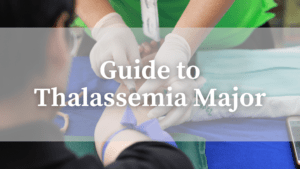Thalassemia minor does not progress to thalassemia major on its own.
The inheritance pattern for thalassemia is autosomal recessive, which means that both parents must be carriers of the mutated gene for their child to be at risk of having thalassemia major. If both parents are thalassemia carriers, there is a 25% chance with each pregnancy that their child will have thalassemia major.
Thalassemia minor, also known as thalassemia trait, is a genetic condition in which a person carries one copy of a mutated hemoglobin gene. Individuals with thalassemia minor usually have mild or no symptoms and lead normal lives without requiring treatment.
Thalassemia major, on the other hand, is a more severe form of the condition. It occurs when a person inherits two copies of the mutated hemoglobin gene, one from each parent. Thalassemia major typically results in significant anemia and requires regular blood transfusions and other forms of treatment like iron chelation to manage the symptoms. You can read more about thalassemia major in this guide I wrote some time ago.
In this article, we will explore some common questions and concerns surrounding thalassemia minor.
Is thalassemia minor life long?
Yes, thalassemia minor is a lifelong condition. Individuals with thalassemia minor carry one copy of the mutated hemoglobin gene and usually experience mild or no symptoms. While it does not progress to thalassemia major on its own, it is important to understand the inheritance patterns and associated risks when considering family planning.
So if you know you are thalassemia carrier or have the thalassemia trait, you should get your partner tested for it as well. Click here to find out more about the thalassemia test.
Can minor thalassemia be cured?
As a genetic disorder, thalassemia cannot be cured. However, individuals with thalassemia minor lead normal lives without requiring specific treatment.
Regular check-ups with a healthcare professional are recommended to monitor hemoglobin levels and overall health.
Is it OK to marry thalassemia minor?
If both partners have thalassemia trait, there is a risk of having a child with thalassemia major.
It is important for individuals with thalassemia minor to consider genetic counseling before marriage or having children to understand the specific risks involved and make informed decisions.
Do thalassemia minors require iron chelation?
Thalassemia minor does not typically require iron chelation therapy.
Iron chelation therapy is primarily used in individuals with thalassemia major who receive regular blood transfusions, as excess iron can accumulate in the body due to the transfused blood.
Read this article I wrote on how to reduce ferritin levels naturally.
What should be avoided in thalassemia minor?
While individuals with the thalassemia trait can lead normal lives, there are a few considerations to keep in mind. It is advisable to avoid iron supplements unless specifically prescribed by a healthcare professional, as excess iron can be harmful.
I would recommend adding honey (check out this article on how to buy pure honey) and black seed oil to your diet as well.
Additionally, it is important to maintain a healthy lifestyle, including a balanced diet and regular exercise, to support overall well-being.
Can you live a normal life with thalassemia minor?
Yes, individuals with thalassemia minor can lead normal, healthy lives.
The condition does not typically cause significant health issues or limitations. As already mentioned, I still recommend regular check-ups with a healthcare professional to monitor hemoglobin levels and overall health.
Can thalassemia minor take iron?
Iron supplementation is generally not necessary for individuals with thalassemia minor, as they do not have significant iron deficiency.
However, it is essential to consult with a healthcare professional for personalized advice based on individual circumstances. Your doctor might prescribe you an iron supplement if required, after testing your iron levels.
Can thal minor donate blood?
In most cases, individuals with thalassemia minor can donate blood if their hemoglobin levels are in the normal ranges.
Thalassemia minor does not affect the ability to donate blood, as long as other eligibility criteria are met. However, it is important to check the specific guidelines and requirements set by blood donation centers or organizations.
Conclusion
Thalassemia minor is a lifelong condition characterized by mild or no symptoms. While it does not progress to thalassemia major on its own, individuals with thalassemia minor should be aware of the risks associated with family planning.
Genetic counseling can provide valuable information and guidance for individuals and couples considering marriage or having children. With proper monitoring and healthcare, individuals with thalassemia minor can live normal, healthy lives.




